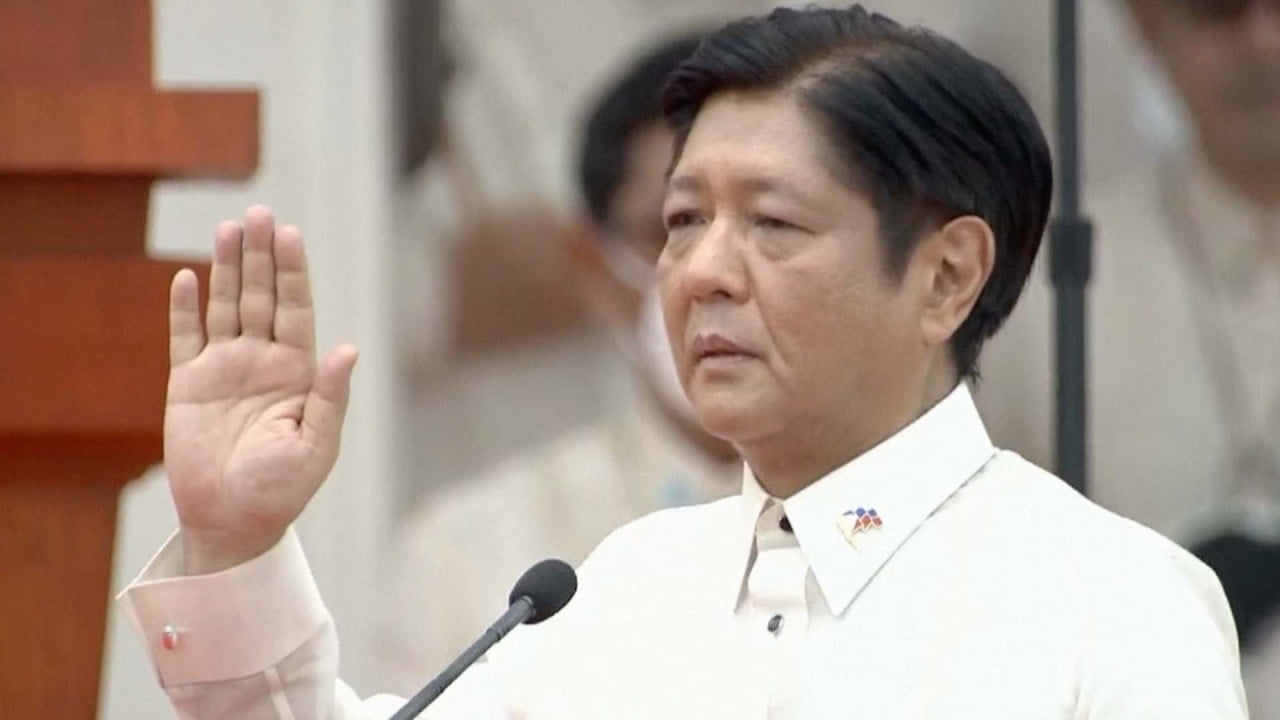
As Philippines economy stutters, can Marcos keep promises on more jobs, cheaper food?
- With the country’s finances battered by the pandemic, the president has signalled his election pledges, including reducing the price of rice to 36 US cents a kg, can wait
- Analysts say if Marcos Jnr fails to ease the economic pain it will break his family’s legacy after he successfully rehabilitated their name
The government simply lacks the fiscal space to allow tax concessions, or spend big on building bridges, roads and ports after racking up debt to help cushion the impact of the pandemic. That’s forcing Marcos Jnr, the only son of late dictator Ferdinand Marcos, to take a different path.
The first signals from his new administration are that populism can wait. He’s vetoed a proposal to create a special economic zone and a free port covering San Miguel Corp.’s New Manila International Airport because it came at a cost to the government: tax revenue.
It’s not just companies for which Marcos Jnr is reassessing benefits. The 64-year-old leader recently tempered his campaign pledge to reduce the price of rice to 20 pesos (36 US cents) a kilogram as an aspiration and walked back on his support for suspending oil excise tax.
Marcos’ work cut out for him, from Philippines’ energy crisis to China oil deal
“The most important area will have to be the economy,” Marcos Jnr said in his first Cabinet meeting on July 5. His comments at a press conference days before assuming the presidency provided more insight into how he plans to manage the economy. Social programmes will be “very focused” because the government is “not so well funded,” he said.
Marcos Jnr’s performance on economic issues will make or break his family’s legacy after he successfully rehabilitated their name, said Ronald Holmes, a professor of political science and development studies at De La Salle University in Manila.
“If he fails to address the problems, including inflation and employment, that will definitely hurt his presidency, and in the longer term, lessen whatever is the appreciation of the family’s legacy.”
For all his focus on fiscal prudence, Marcos Jnr isn’t free of missteps. His comments on Tuesday that inflation was “not that high” despite June data showing prices rising 6.1 per cent are prone to being interpreted as insensitive. That prompted his economic managers to clarify that the president was referring only to the year-to-date number that averaged 4.4 per cent.
Concurrently, the new administration has said it prefers targeted support programmes over wide-scale subsidies and excise tax suspensions to help ease the pain of rising prices.
The Philippines isn’t alone in facing budget constraints. Many Asian economies are also dealing with finances battered by the pandemic, and are trying to work around by cutting spending, including weaning all but the most-needy households away from subsidies to shield them from inflation.
There aren’t enough jobs. How can everyone pay for growing bills?
Interest rate hikes by monetary authorities worldwide in an effort to stem price gains and protect currencies – including by the Philippine central bank – are also making borrowings costlier for everyone, including the government.
Among those feeling the pinch in the Philippines is lottery bet collector Luzviminda Veruen, who is one of the more than 31 million who voted for Marcos Jnr. She’s holding on to his promise to slash rice prices.
“There aren’t enough jobs. How can everyone pay for growing bills?” said Veruen, as she fell in line in front of Marcos’s campaign headquarters waiting for free lunch. “I hope the Philippines, as Bongbong promised, will soon rise again, soon thrive again,” she added, using the president’s nickname.
Despite the challenges, a Bloomberg survey showed that the Philippine economy will grow annually by at least 6 per cent through 2024. That’s a pace officials say would pare government debt back to below the 60 per cent of output typically viewed as sustainable and bring the poverty rate down to single digits.
Expanding by that clip over the medium term would also help secure a sovereign credit ratings upgrade, and bring investor confidence back, according to Christian de Guzman, senior vice-president at Moody’s Investors Service in Singapore.
‘Ferdinand Marcos Airport’ proposal by Philippine leader’s ally draws criticism
Ensuring the Philippines will meet its debt obligations is the first priority, Finance Secretary Diokno has said. Principal payments for pandemic-related borrowings are due from 2023, according to former finance officials.
Tax management will be improved in the early years to fund projects without adding tariffs nor bloating debt, said Diokno, who’s also a former budget minister. The government will also revive a public-private partnership programme to bankroll infrastructure.
“We have to be creative here. We have to engage the private sector,” Marcos Jnr’s Economic Planning Secretary Arsenio Balisacan said at a July 4 briefing.
For de Guzman at Moody’s, the current debt level isn’t the main concern, as interest costs form less than 10 per cent of revenue. “The uncertainty comes in terms of the path, the trajectory of institutions and government strength,” he said.

The Philippines, like many emerging economies, is no stranger to political flux. Previous presidents were embroiled in corruption scandals and faced coups that hurt efforts to liberalise and grow the economy. In 1986, a popular uprising against the dictatorship led the Marcoses to flee the nation.
Social media narratives helped to paint his father’s dictatorship as a “golden age” when the economy was flourishing, prices were low and infrastructure was booming, eventually winning Marcos Jnr the presidency. However, these online narratives will have to contend with real-world economic pain, given inflation has typically been one of the public’s top concerns in the Philippines.
“It’s really a question of how difficult life would be for many Filipinos,” De La Salle professor Holmes said. “Being elected is one thing, fulfilling your promises is another.”


